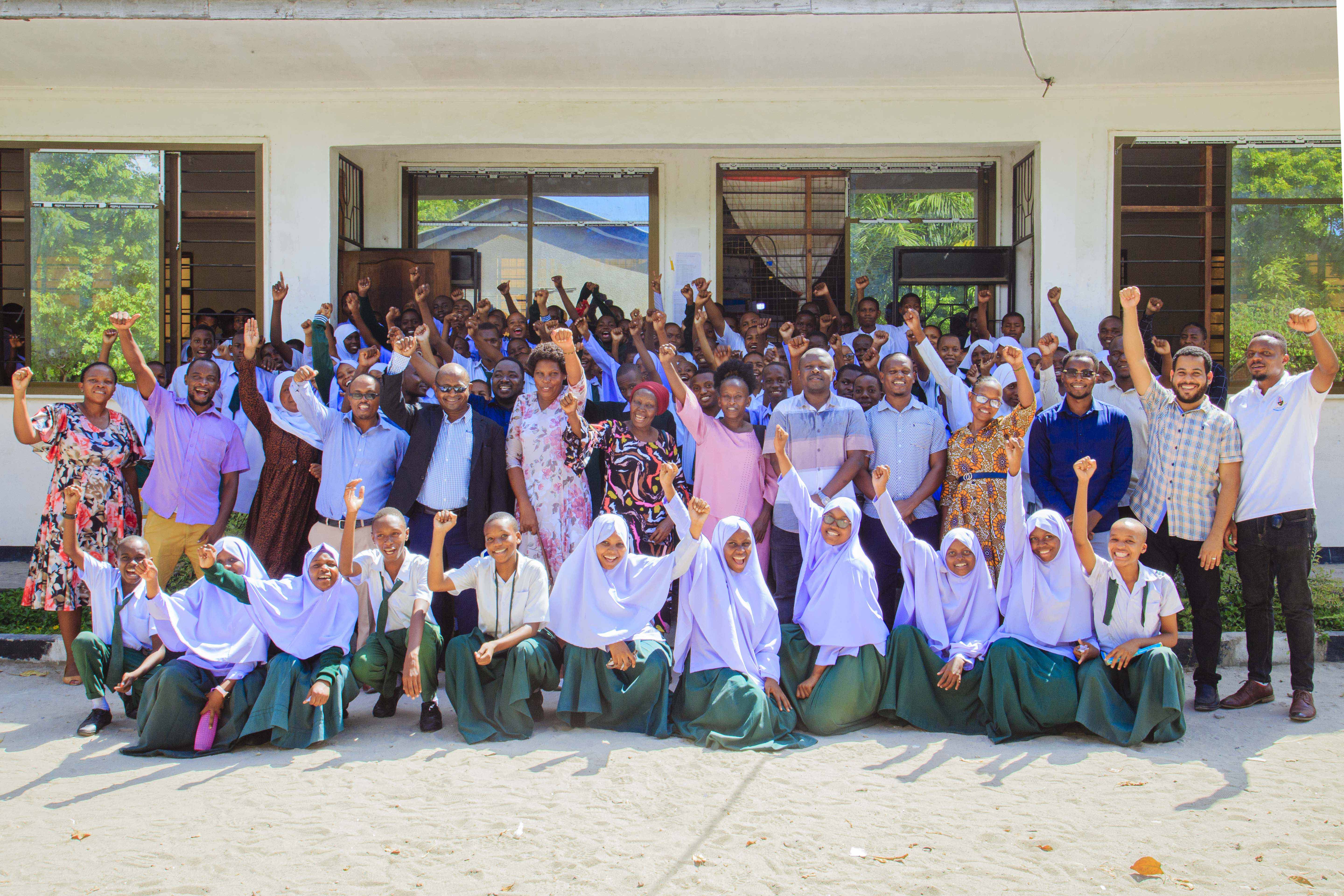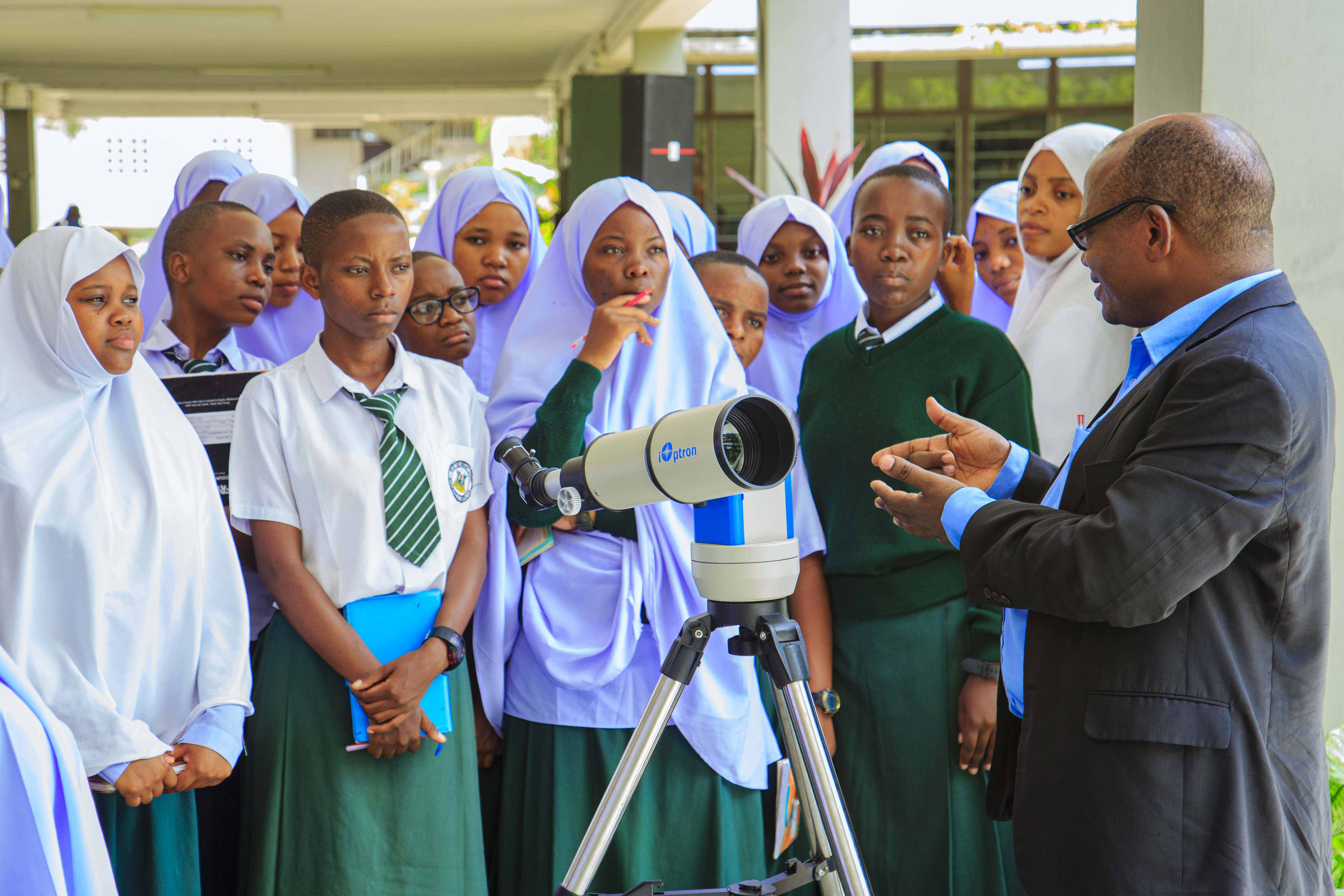Prof. Mureithi and Dr Samiji ignite a passion for STEM in female secondary school students
By Jackson Isdory, CMU
In a demonstration of strategic vision and commitment to fostering Science, Technology, Engineering and Mathematics (STEM) excellence, the University of Dar es Salaam celebrated the International Day of Women and Girls in Science on 11 February 2025 with an innovative outreach initiative to two secondary schools.
On this day, members of academic staff from the Department of Physics and the Department of Mathematics visited Yusuph Makamba and Ruvu Girls Secondary Schools, in Dar es Salaam and Coast regions, respectively, and conducted hands-on scientific demonstrations with motivational dialogues to ignite young girls’ passion for STEM fields.

The initiative, designed as a high-impact engagement strategy and backed by the International Science Programme (ISP) through the East Africa Network for Women in Basic Sciences, marked a significant milestone in advancing gender inclusivity in science education.
At the heart of the initiative were internationally recognised scientists, Prof. Eunice Mureithi from the Department of Mathematics and Dr. Margaret Samiji from the Department of Physics, whose visionary leadership drove the programme’s success.
“This programme reinforces the University’s core values of innovation, inclusivity, and community empowerment by showcasing the real-world applications of science and mathematics. It underscores UDSM’s commitment to fostering cross-institutional collaboration to achieve transformative educational outcomes”, said Prof. Mureithi.
She added that by fostering an environment of hands-on learning and mentorship, the initiative was building a robust foundation for a future where science and innovation know no gender boundaries.
Meanwhile, Dr. Samiji noted that, “We are proud to lead an initiative that empowers young women to see themselves as the architects of the future of science. Our mission is to educate and inspire and to catalyse lasting change.
Dr. Samiji, who is also well known as the first woman to get a PhD in Physics in Tanzania – which she obtained from the University of Port Elizabeth, South Africa in 2003, said this event was a strategic investment in human capital that would yield long-term societal benefits.
The implementation of this initiative resulted from a carefully planned and dedicated coordination by the College of Natural and Applied Sciences Departments of Physics and Mathematics led by Dr. Mwingereza John Kumwenda and Dr. Marco Mpimbo, respectively, who worked collaboratively to ensure a dynamic and impactful programme that integrated theoretical knowledge and practical application.
Community stakeholders resoundingly supported the initiative, which highlighted its transformative potential in empowering young women in STEM.
Ms. Juliana Chimanzi, the Headmistress of Ruvu Girls Secondary School, lauded the initiative, stating: “This programme has served as a model for strategic collaboration between universities and secondary schools. It has inspired our students and reinforced science’s critical role in shaping their futures.”
Similarly, Ms. Kane Kibangali, the Headmistress of Yusuph Makamba Secondary School, emphasised the importance of such engagements: “Our students’ enthusiasm is a powerful testament to the transformative potential of this outreach. Initiatives like these are essential in breaking down barriers and creating new pathways for girls in STEM education.”
Aligning with National Priorities and Future Commitments
UDSM’s outreach initiative aligns with the government’s strategic objectives under the visionary leadership of H.E. Dr. Samia Suluhu Hassan, President of the United Republic of Tanzania, who has prioritised STEM education as a driver of national development.
By actively engaging young girls in science, UDSM contributes to Tanzania’s Education Sector Development Plan (ESDP) and the National Strategy for Gender Development, emphasising the importance of increasing female participation in STEM disciplines.
As part of its ongoing commitment to gender inclusivity in STEM, UDSM will continue to expand its outreach efforts by strengthening mentorship programmes to provide sustained guidance for young female students, enhancing industry partnerships to create real-world opportunities for aspiring female scientists, and developing structured follow-up initiatives that track and support students who participate in STEM programmes.
UDSM’s comprehensive outreach programme on the International Day of Women and Girls in Science is a testament to the power of strategic educational engagement. The University has set a new benchmark in empowering female scientists and advancing STEM education by uniting visionary leadership, academic excellence, and strong community partnerships.



